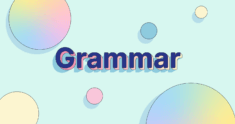
Most of the time, when we think about pronouns, we’re thinking about definite pronouns (like she, their, it, or that), which replace a specific noun—one that you used earlier or one that is so easily understood by your listener or reader that it can be left out. But there’s another kind of pronoun that refers to a nonspecific noun: the indefinite pronoun. Keep reading to understand what indefinite pronouns are and how to use them.
What is an indefinite pronoun?
An indefinite pronoun refers to a general, vague, or unknown person, object, group, or amount. Most of the time, the referred-to object is identified elsewhere in the sentence or doesn’t need to be precisely identified.
- I’ve had one piece of pie, and I’d like another.
- Much has been written about the way Americans feel about their cars.
Many of the most common indefinite pronouns are formed by combining the prefixes every-, any-, some-, and no- with the roots –thing, –one, and –body. Any and some can also stand alone as indefinite pronouns.
- “I am a nice person,” Claire insisted. “Ask anyone.”
- It’s not true that the American moon landing was staged in a television studio, as some believe.
There are also common indefinite pronouns that are not compounds. Below, the most common indefinite pronouns are listed along with whether they are singular or plural in construction.
6 types of indefinite pronouns
There are several categories of general things that indefinite pronouns tend to refer to.
1 All of something
Indefinite pronouns can refer to all of something or to all the components or members of a group.
- Everybody needs shelter and food.
- All are welcome.
- I’ve tried everything on the menu at that restaurant.
2 Singling out
They can communicate that something or someone is being singled out from a group.
- The child thanked each of their friends for coming to their birthday party.
- Alec thought either of the pairs of trousers would be a good option for work.
- Neither of the two vegetarian options on the menu appealed to Lin.
3 Multiple possibilities
They can convey a broad or infinite range of possibilities.
- I can recommend any of the menu items here.
- Have you invited anybody to the dance yet?
4 One nonspecific object
They can refer to a single, unspecified or unknown person or thing.
- Someone left their shoes on the lawn last night.
- Jan thought he remembered hearing something out of the ordinary while he was sleeping.
5 Absence
They can indicate absence.
- Maryam stopped by her neighbors’ apartment, but nobody was there.
- I wanted to buy a pastry at the bakery, but none were left.
- Nothing compares with the smell of coffee in the morning.
6 Amounts and quantities
They can refer to general amounts and quantities.
- Many of the students at the university speak multiple languages.
- Do you like Ethiopian restaurants? Greta can recommend some.
- Sometimes I make a sandwich and eat only half.
- I could say more, but I think you’ve heard enough.
Using indefinite pronouns
Subject-verb agreement
Like nouns and other pronouns, indefinite pronouns have the grammatical property of numbers. This means that when an indefinite pronoun is the subject of a sentence, you need to know whether it is singular or plural so that you can be sure it’s in subject-verb agreement with the sentence’s verb. Most indefinite pronouns are singular, but some are plural, and some can be singular or plural depending on context and whether you’re using formal or informal speech or writing.
Singular indefinite pronouns
The most common singular indefinite pronouns are another, anybody/anyone, anything, each, either, enough, everybody/everyone, everything, less, little, much, neither, nobody / no one, nothing, one, other, somebody/someone, something, and you. Here are some examples of singular indefinite pronouns in sentences:
- Is there anything I can do to help?
- Less is more.
- Sometimes one finds oneself not knowing what to say. (formal)
- Sometimes you find yourself not knowing what to say. (informal)
Plural indefinite pronouns
The most common plural indefinite pronouns are both, few, fewer, many, others, several, and they.
- Have you met the two project coordinators? Both are wonderful to work with.
- They say it takes a village to raise a child.
- Can you find out what others think about the issue?
Indefinite pronouns that can be singular or plural
Some indefinite pronouns can be either singular or plural depending on what they’re referring to. They include all, any, more, most, none, some, and such.
- All is well that ends well.
- If all are here, we can start the meeting.
- Of the energy generated by burning fuel to create electricity, most is lost in the form of heat.
- There are quite a few senior citizens who live in my building; most live alone.
- We need rain, but none is in the forecast.
- Meryl looked for a parking spot, but none were available.
Subjective vs. objective case
Indefinite pronouns can be either subjective or objective, and they have the same form regardless of which case they are functioning as in a given sentence.
- They’d like to tell somebody their story.
- Somebody who knows me well must have written this review.
Negation
As we’ve seen, some indefinite pronouns carry negative meanings, expressing the absence of something.
She wanted to buy a hybrid car, but none were available at the dealership.
Another way to express negation with indefinite pronouns is to use the word not. An important thing to keep in mind with this kind of sentence is that not calls for the any- indefinite pronouns to communicate, not the some- ones.
Modifiers
Indefinite pronouns are often modified by adjectives—which sets them apart from other kinds of pronouns. In many cases, the adjective in question is else, which appears after the indefinite pronoun.
Will anyone else I know be at the party?
Prepositional phrases and dependent clauses also frequently modify indefinite pronouns, providing clarity about what the pronouns refer to.
- Have any of the invitations been sent yet?
- There isn’t much that Jill can’t accomplish when it comes to home repairs.
Indefinite pronouns FAQs
What is an indefinite pronoun?
An indefinite pronoun is a pronoun that refers to a general, vague, or unknown person, object, group, or amount.
What kinds of nonspecific things can an indefinite pronoun refer to?
An indefinite pronoun can refer to all of something, something singled out from a group, a range of possibilities, one nonspecific person or thing, an absence, or a nonspecific amount or quantity.
What are some rules of thumb for indefinite pronouns?
Most, but not all, indefinite pronouns are singular. When an indefinite pronoun is the subject of a sentence, it has to agree in number with the sentence’s verb. Indefinite pronouns can switch between the subjective and the objective case and don’t change form when they do.
Negation can be indicated with the no- indefinite pronouns or by using not and the any- indefinite pronouns. Indefinite pronouns often appear alongside modifiers to clarify what they are referring to.






